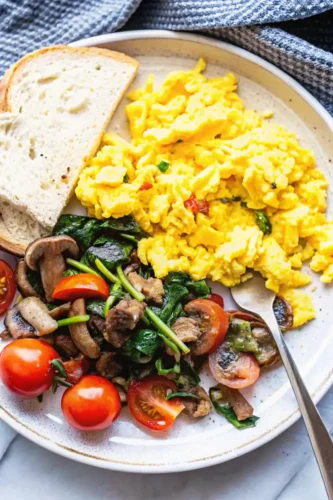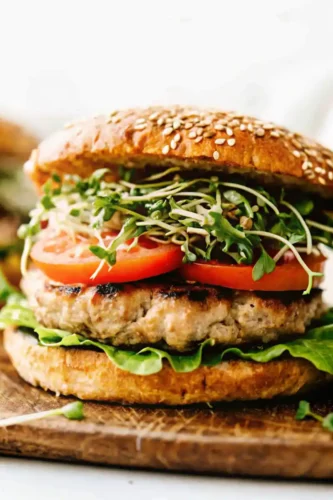Overnight oats are a game-changer for busy mornings! This simple, no-cook breakfast is packed with fiber, protein, and nutrients, offering a perfect balance of taste and health benefits. Whether you prefer the creamy simplicity of blended overnight oats or indulgent flavors like tiramisu overnight oats, there’s a recipe for everyone. This versatile meal supports digestion, heart health, and sustained energy, making it an excellent choice for weight management and overall wellness.
In this article, we’ll explore the benefits of overnight oats, unpack their nutritional value, and share tips for creating your own delicious variations. Get ready to make breakfast exciting again!
Table of Contents
What Are Overnight Oats?
Overnight oats are a no-cook, hassle-free breakfast made by soaking rolled oats in liquid (like milk or plant-based alternatives) overnight. The oats absorb the liquid, becoming soft and creamy by morning. This simple process makes them a go-to choice for anyone looking for a nutritious, grab-and-go meal.
The key? They’re super versatile! You can mix them with fruits, nuts, seeds, and even superfoods like chia or kefir for an added boost of nutrients. Plus, they taste great cold, which is perfect for those who aren’t fans of hot oatmeal.
The Good Stuff in Overnight Oats
What Makes Overnight Oats So Nutritious?
Let’s talk nutrients! Overnight oats are loaded with fiber, vitamins, and minerals that can do wonders for your body. By simply soaking oats overnight, you unlock their full nutritional potential, making them easier to digest and even more beneficial for your health.
Here’s a quick rundown of the key nutrients in overnight oats:
- Fiber: Keeps your digestion smooth and supports heart health.
- Protein: Essential for muscle repair and keeping you full.
- Magnesium and Iron: Great for energy and reducing fatigue.
- Beta-Glucan: A type of soluble fiber that helps lower cholesterol.
Using chia seeds, kefir, or dates in your oats? That adds even more nutritional goodness! These ingredients bring extra protein, probiotics, and natural sweetness to the table.
Are Cold Oats as Healthy as Cooked Oats?
You might be wondering, “Is overnight oatmeal healthy even though it’s not cooked?” Absolutely! The soaking process breaks down the phytic acid in oats, making it easier for your body to absorb nutrients. It’s like a mini science experiment in your fridge!
In fact, cold oats often retain more of their natural nutrients compared to cooked oats. Plus, the creamy texture and chilled flavor make them a refreshing alternative to traditional hot oatmeal.
When compared to cereals (which are often high in sugar), overnight oats are a much healthier option. If you’ve been asking yourself “cereal or oatmeal?”—oats are the clear winner!
Boosting the Nutrition of Overnight Oats
One of the best things about overnight oats is how customizable they are. You can easily amp up their health benefits with a few simple add-ins:
- Chia Seeds: These tiny seeds are packed with omega-3s and fiber.
- Kefir or Yogurt: Probiotics for gut health.
- Cottage Cheese: Add a creamy layer of cottage cheese for extra protein and a unique texture. It’s perfect for balancing sweet fruits like berries or bananas.
- Fresh Fruits: Antioxidants and natural sweetness.
- Nuts and Seeds: Healthy fats to keep you full longer.
- Dates: A great source of natural sugar and potassium.
Try layering these in your jar for a breakfast that’s as nutritious as it is Instagram-worthy!
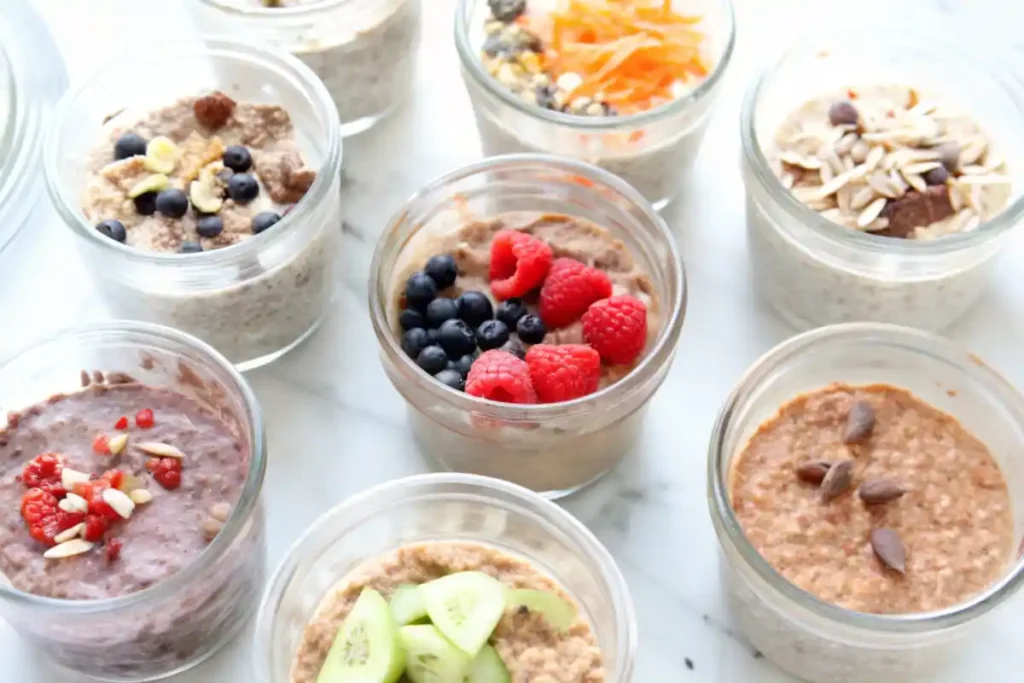
Health Benefits of Overnight Oats
Better Digestion with Overnight Oats
If you’ve ever struggled with digestion, overnight oats are here to help! Thanks to their high fiber content, they’re a gentle way to support your digestive system. The soluble fiber, beta-glucan, in oats helps regulate bowel movements, prevent constipation, and improve gut health overall.
Adding toppings like chia seeds or kefir can further enhance these benefits. Chia seeds, for instance, are packed with fiber, while kefir delivers gut-friendly probiotics. This combination makes overnight oats the ultimate choice for a happy tummy!
A Weight-Loss-Friendly Breakfast
Looking to shed a few pounds or maintain a healthy weight? Overnight oats can be your secret weapon. They’re low in calories but packed with nutrients, which means you’ll feel fuller for longer without reaching for snacks before lunch.
Oats release energy slowly, preventing blood sugar spikes that often lead to hunger cravings. Pairing them with protein-rich toppings like yogurt or nuts makes them even more satisfying. So, if you’ve been asking, “What are overnight oats good for?”—this is definitely one answer!
Heart-Healthy Goodness
Overnight oats are a heart’s best friend. They’re rich in beta-glucan, a soluble fiber that helps lower LDL (bad cholesterol) levels. Studies have shown that regularly eating oats can reduce the risk of heart disease.
Topping your oats with walnuts or adding flaxseeds can give your breakfast an extra heart-healthy boost. Plus, they’re a great way to maintain healthy blood pressure and overall cardiovascular health.
All-Day Energy Boost
Starting your day with overnight oats is like giving your body a slow-releasing fuel source. Oats are full of complex carbohydrates, which provide steady energy throughout the morning. Unlike sugary cereals that lead to mid-morning crashes, overnight oats keep you energized and focused.
For an extra energy kick, try adding bananas, peanut butter, or a drizzle of honey. These natural ingredients complement the oats perfectly while keeping you productive all morning.
Overnight Oats vs. Other Breakfast Choices
When it comes to breakfast, we’re often faced with the age-old question: “Cereal or oatmeal?” The verdict? Oatmeal, especially overnight oats, wins hands down. Here’s why:
- Lower Sugar: Many cereals are loaded with added sugars, while overnight oats allow you to control sweetness naturally.
- More Fiber: Overnight oats are a fiber-rich option compared to most cereals.
- Customizable: Unlike pre-packaged cereals, you can tailor your oats to fit your nutritional needs and taste preferences.
So, the next time you’re debating “oatmeal vs. cereal”, you’ll know what to choose!
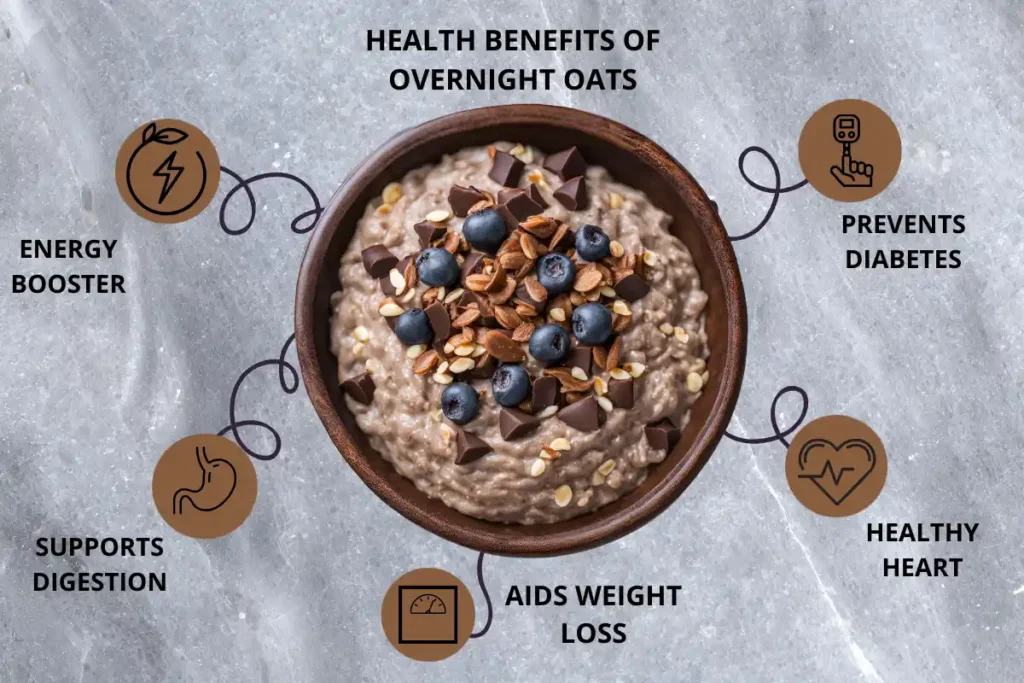
Who Can Benefit from Overnight Oats?
Overnight Oats Are Perfect for Everyone
One of the best things about overnight oats is how adaptable they are. Whether you’re a busy parent, a fitness enthusiast, or someone with specific dietary needs, this versatile breakfast works for you. Let’s break down how overnight oats benefits different groups and why they’re such a smart choice for anyone, at any stage of life.
Overnight Oats for Kids and Toddlers
If you’re wondering whether overnight oats are suitable for children, the answer is a big yes! They’re a fantastic option for growing kids because they’re packed with nutrients like fiber, iron, and calcium. Plus, they’re easy to customize with kid-approved toppings like bananas, peanut butter, or a drizzle of honey.
For toddlers, you can make the texture softer by adding more milk or yogurt. Including fruits like blueberries or mashed bananas adds natural sweetness without the need for added sugar. It’s a nutritious way to keep those little tummies full and energized!
Overnight Oats for Fitness Enthusiasts
Looking for a post-workout recovery meal or a pre-workout energy boost? Overnight oats are a top pick for fitness lovers. The combination of complex carbs and protein helps refuel muscles and sustain energy levels.
Want to supercharge your oats? Add a scoop of protein powder or toppings like chia seeds and almonds. This turns a simple jar of oats into a protein-packed powerhouse that’s perfect for muscle repair and recovery.
A Vegan and Gluten-Free Breakfast Option
Overnight oats are easily adaptable for plant-based eaters or those with gluten sensitivities. For a vegan version, swap regular milk for almond, oat, or coconut milk. Top with plant-based ingredients like berries, nuts, or coconut flakes for a flavor-packed meal.
For a gluten-free version, simply ensure you’re using certified gluten-free oats. This makes overnight oats a safe and satisfying option for those with celiac disease or gluten intolerance.
The Advantages of Choosing Overnight Oats
Still debating whether overnight oats are the right choice? Let’s make it simple. Here’s why they’re better than many traditional breakfasts:
- Convenience: Prep them the night before and grab them in the morning—no cooking required!
- Versatility: Sweet or savory, simple or loaded with toppings, the possibilities are endless.
- Healthy Ingredients: Unlike sugar-laden cereals, you control what goes into your oats.
With so many health benefits of overnight oats, they’re an easy way to make breakfast both nutritious and delicious.
How to Get the Best Out of Your Overnight Oats
Customizing Your Overnight Oats to Match Your Taste
The beauty of overnight oats lies in how easily you can make them your own. Whether you’re craving something fruity, nutty, or indulgent, there’s a combination out there for you. Customizing overnight oats doesn’t just make them tastier—it also enhances their nutritional value.
Here are some creative ways to make your overnight oats shine:
- Add Fresh Fruits: Blueberries, bananas, or diced apples add natural sweetness and antioxidants.
- Mix in Superfoods: Chia seeds, flaxseeds, or a spoonful of nut butter boost protein and healthy fats.
- Sweeten Naturally: Use honey, maple syrup, or chopped dates instead of processed sugar.
- Top It Off: Sprinkle nuts, granola, or shredded coconut for extra crunch.
For something truly unique, try a layered jar with oats, overnight oatmeal with kefir, and fruit. This not only looks great but also offers probiotics for gut health!
Avoid These Common Mistakes
Even though overnight oats are simple to prepare, a few missteps can take them from delicious to disappointing. Avoid these pitfalls to ensure a perfect jar every time:
- Using Too Much Liquid: While oats need liquid to soften, overdoing it can leave you with a soupy mess. Stick to a 1:1 ratio of oats to liquid and adjust slightly based on preference.
- Skipping the Sweetener: While you don’t need added sugar, a little honey or fruit can balance the oats’ natural earthiness.
- Not Stirring Well: Mixing your ingredients thoroughly ensures the flavors are evenly distributed.
- Forgetting the Soaking Time: Overnight oats need at least 6–8 hours in the fridge to achieve that creamy consistency.
FAQs About Overnight Oats Benefits
Can oats reduce belly fat?
While overnight oats aren’t a magic solution for weight loss, they can certainly support a balanced diet aimed at reducing belly fat. The fiber in oats, particularly beta-glucan, promotes satiety, which helps control calorie intake. Oats also stabilize blood sugar levels, preventing spikes that lead to fat storage.
To maximize the belly-fat-burning potential of your overnight oats:
Avoid sugary toppings and use natural sweeteners like honey or fruits.
Add metabolism-boosting ingredients like cinnamon, chia seeds, or almond butter.
Pair oats with protein-rich foods like Greek yogurt for an extra satiety boost.
What not to add in overnight oats?
While overnight oats are highly customizable, certain ingredients can undermine their health benefits:
Excessive Sugar: Skip sugary syrups or pre-flavored yogurts. Opt for natural sweetness from fruits or a small drizzle of honey.
Artificial Ingredients: Processed additives like flavored powders or whipped cream add unnecessary calories and chemicals.
Too Many Crunchy Add-Ins: Ingredients like granola or hard nuts should be used sparingly to avoid overpowering the oats’ texture.
Dairy if You’re Intolerant: For those with lactose intolerance, avoid regular milk or yogurt. Choose plant-based alternatives instead.
What are the disadvantages of overnight oats?
While overnight oats are packed with benefits, they aren’t perfect for everyone:
Cold Texture: Some people may prefer the warmth of cooked oats, especially during colder months.
Calorie Overload: Overloading with calorie-dense toppings like nut butters, seeds, and dried fruits can turn a healthy meal into an indulgence.
Gluten Sensitivity: Though oats are naturally gluten-free, cross-contamination can occur. Choose certified gluten-free oats if needed.
Digestive Sensitivity: If you’re new to high-fiber foods, overnight oats may cause temporary bloating. Start with smaller portions and increase gradually.
Wrapping It Up
Overnight oats have proven to be more than just a trendy breakfast—they’re a nutritious, time-saving option that fits seamlessly into any lifestyle. Whether you’re aiming to improve your health, manage your weight, or simplify your mornings, this versatile meal delivers on all fronts.
With their health benefits, including heart support, better digestion, and long-lasting energy, overnight oats truly stand out among other breakfast options. Plus, they’re customizable to suit every taste and dietary need, making them perfect for anyone from toddlers to busy professionals.
By experimenting with toppings, flavors, and superfood add-ins, you can turn a simple jar of oats into a flavorful, nutrient-dense breakfast. And with the right portion sizes and healthy choices, overnight oats can easily become a cornerstone of a balanced diet.
So, the next time you’re looking for a breakfast that’s both delicious and packed with goodness, grab a jar of overnight oats and enjoy the perfect start to your day!
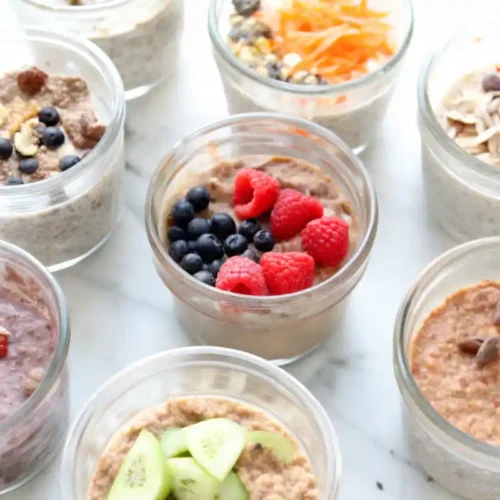
Classic Overnight Oats with a Twist
Ingredients
- ½ cup rolled oats gluten-free if needed
- ½ cup almond milk or your favorite plant-based milk
- 1 tablespoon chia seeds
- 1 tablespoon honey or maple syrup
- ½ teaspoon cinnamon
- ¼ cup diced apples
- 1 tablespoon walnuts
Instructions
- In a jar or bowl, combine oats, almond milk, chia seeds, honey, and cinnamon. Stir well.
- Add the diced apples and gently mix. Cover and refrigerate overnight.
- In the morning, give the oats a quick stir, then top with walnuts for a satisfying crunch.
- Enjoy straight out of the jar or transfer to a bowl if preferred.
Notes
- For a vegan option, replace honey with maple syrup.
- Add additional toppings like berries, bananas, or shredded coconut for variety.
- Store in the refrigerator for up to 2 days for a make-ahead breakfast.




